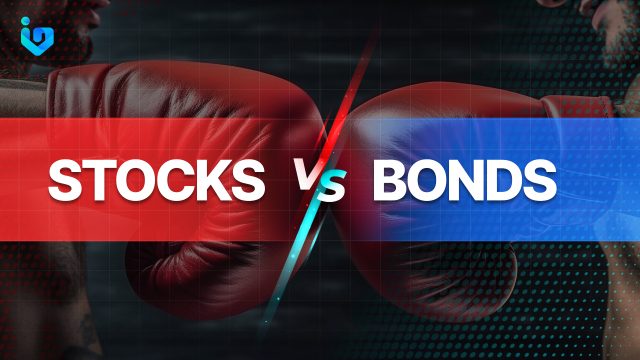If you are looking for ways to invest your money, you may have heard of stocks and bonds. These are two of the most common types of securities that investors can buy and sell in the financial markets. But what are the differences between them, and how do they fit into your portfolio?
What Are Stocks?
Stocks, also known as equities, are shares of ownership in a company. When you buy a stock, you are buying a fraction of the company’s assets and earnings. You become a shareholder, and you have the right to vote on important decisions and receive dividends if the company distributes them.
Stocks are traded on stock exchanges, such as the Nasdaq or the New York Stock Exchange. The price of a stock depends on the supply and demand of the market, as well as the company’s performance, growth potential, and future expectations. Stocks can be classified into different categories, such as common, preferred, growth, value, or dividend.
What Are Bonds?
Bonds, also known as debt securities, are loans that investors make to a company or a government. When you buy a bond, you are lending money to the issuer, who promises to pay you a fixed rate of interest and return the principal amount at a specified maturity date.
Bonds are mainly sold over the counter, rather than on a centralized exchange. The price of a bond depends on the credit quality of the issuer, the interest rate environment, the duration of the bond, and the inflation expectations. Bonds can be classified into different types, such as corporate, municipal, treasury, or junk.
Pros and Cons of Stocks
Stocks offer the potential for higher returns than bonds, but they also come with higher risks. Here are some of the pros and cons of investing in stocks:
Pros
Capital appreciation: Stocks can increase in value over time, especially if the company is growing, profitable, and innovative. You can benefit from the price appreciation by selling your stocks at a higher price than you bought them.
Dividends: Some companies pay dividends to their shareholders, which are regular cash payments from the company’s earnings. Dividends can provide you with a steady income stream and increase your total return on investment.
Liquidity: Stocks are generally easy to buy and sell on the stock exchanges, which means you can access your money quickly if you need to. You can also diversify your portfolio by buying stocks from different sectors, industries, and countries.
Cons
Volatility: Stocks are subject to market fluctuations, which can cause the prices to rise or fall dramatically in a short period of time. Stocks are influenced by various factors, such as economic conditions, political events, industry trends, and company news. You may experience significant losses if the market goes against your expectations.
No guarantee: Stocks do not guarantee any return or income. The company may perform poorly, cut or eliminate dividends, or go bankrupt. You may lose some or all of your initial investment if the company’s value declines or disappears.
Emotional stress: Investing in stocks can be stressful and emotional, especially if you are not prepared for the market volatility and uncertainty. You may be tempted to buy or sell stocks based on your emotions, such as fear, greed, or regret, rather than on your rational analysis and strategy.
Pros and Cons of Bonds
Bonds offer a more stable and predictable return than stocks, but they also have some limitations. Here are some of the pros and cons of investing in bonds:
Pros
Interest income: Bonds pay you a fixed rate of interest, which is usually higher than the interest you can earn from a savings account or a certificate of deposit. You can rely on the interest income to supplement your income or reinvest it to grow your wealth.
Principal protection: Bonds promise to repay you the principal amount at the maturity date, as long as the issuer does not default on its obligations. You can get back your initial investment if you hold the bond until maturity, or sell it at a higher price if the market interest rates decline.
Risk reduction: Bonds are generally considered less risky and more stable than stocks. Bonds have a lower correlation with the stock market, which means they tend to move in different directions. You can reduce the overall risk and volatility of your portfolio by adding bonds to your asset allocation.
Cons
Lower returns: Bonds have a lower potential for growth than stocks, as they are limited by the fixed interest rate and the principal amount. You may miss out on the opportunity to earn higher returns from the stock market if you invest too much in bonds.
Interest rate risk: Bonds are sensitive to changes in the market interest rates, which move inversely to the bond prices. When the market interest rates rise, the bond prices fall, and vice versa. You may lose money if you sell your bonds at a lower price than you bought them, or if you buy new bonds at a lower interest rate than your existing bonds.
Inflation risk: Bonds are vulnerable to inflation, which erodes the purchasing power of your money over time. The fixed interest rate and the principal amount of your bonds may not keep up with the rising cost of living, especially if the inflation rate is higher than the interest rate. You may lose money in real terms if the inflation rate exceeds your bond returns.
Which Should You Choose?
There is no definitive answer to whether you should invest in stocks or bonds, as it depends on your personal goals, time horizon, and risk tolerance. However, here are some general guidelines to help you decide:
If you are looking for higher returns and can tolerate higher risks, you may prefer stocks over bonds. Stocks can offer you the opportunity to grow your money faster and benefit from the long-term growth of the economy and the companies. Of course, these all come with inherently more risk. If you are looking for lower risks and more stability, you may prefer bonds over stocks. Bonds offer you a more predictable and reliable income stream and protect your principal amount.

